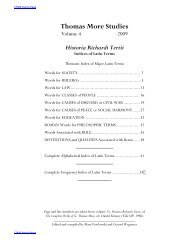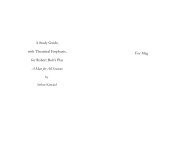Study Guides for Utopia - The Center for Thomas More Studies
Study Guides for Utopia - The Center for Thomas More Studies
Study Guides for Utopia - The Center for Thomas More Studies
Create successful ePaper yourself
Turn your PDF publications into a flip-book with our unique Google optimized e-Paper software.
Apparent Contradictions in <strong>More</strong>'s <strong>Utopia</strong> (Cambridge UP, Revised edition)<br />
1. On the size of <strong>Utopia</strong>: p. 41 (30,000 square miles -- smaller than Scotland) vs. p. 43 (100,000 square miles -<br />
- the size of Great Britain)<br />
2. On the cities: Raphael says that the cities are “built on the same plan and have the same appearance” (43)<br />
and that “they're exactly alike” (44), yet he then goes on to say that “Amaurot [is] the most worthy of all” the<br />
cities and that “its eminence is acknowledged by the other cities” (44-45). What accounts <strong>for</strong> this difference?<br />
3. On the work of farming: Raphael insists that “everyone” farms, “with no exception” (48). This insistence<br />
is rein<strong>for</strong>ced in the following paragraph: “Besides farming (which, as I said, everybody per<strong>for</strong>ms)....” Yet he<br />
then tells us that several hundred in each city are “permanently exempted from work so that they may devote<br />
themselves to study” (52).<br />
4. On travel: Raphael says that “anyone” who wants to travel “can easily obtain permission...” (58). Yet what<br />
follows is such a list of restrictions, obligations, and severest of punishments that no one could say that it is<br />
easy to travel in <strong>Utopia</strong>.<br />
5. On slavery: Raphael says that “the only prisoners of war the <strong>Utopia</strong>ns keep as slaves are those captured in<br />
was they fight themselves.” <strong>The</strong> children of slaves are not born into slavery, nor are any slaves imported from<br />
<strong>for</strong>eign countries” (77, emphasis added). This leads one to think that slaves are restricted in number and<br />
somewhat mercifully treated. Does the rest of the book support this position?<br />
6. On laws: Raphael repeats on page 82 what he stated on page 37, i.e., that <strong>Utopia</strong> has “very few laws.” Yet<br />
as the footnote on page 37 points out, there are, however, “an oppressive number of codes, customs and<br />
conventions.”<br />
7. On truces: Raphael says the <strong>Utopia</strong>ns make no truces “at all with anyone” (83), but then says they<br />
“observe…religiously” truces made with enemies (92).<br />
8. On warfare: Raphael reports that the <strong>Utopia</strong>ns “utterly despise war as an activity fit only <strong>for</strong> beasts” (85).<br />
Are there exceptions to this position? What reasons are given <strong>for</strong> going to war? What do you think of their<br />
wars <strong>for</strong> colonization (54)?<br />
9. On killing: Raphael argues <strong>for</strong> a strict interpretation of “Thou shalt not kill” in Book 1 (21), thus arguing<br />
<strong>for</strong> no capital punishment <strong>for</strong> crimes, but he then expresses no difficulty with the <strong>Utopia</strong>ns’ desire to<br />
exterminate all Zapoletes (89).<br />
10. On equality: We have been reassured that all of <strong>Utopia</strong>n society is designed to eliminate money and<br />
luxuries, so that all live equally. Why then do some <strong>Utopia</strong>n leaders live “in great style and conduct<br />
themselves like magnates” (p. 92)?<br />
11. On the purpose of <strong>Utopia</strong>'s regime: Compare the different <strong>for</strong>mulations on pages 53 and 97; consider<br />
also the implications of page 50, last sentence of the first full paragraph. <strong>The</strong> crucial clause in the original<br />
Latin is “quorum animus in nullius contemplatione disciplinae consurgit.” Other translations are: “as is the<br />
case with many minds which do not reach the level <strong>for</strong> any of the higher intellectual disciplines” (Yale CW<br />
translation); “if they don't have the capacity <strong>for</strong> intellectual work” (Penguin translation).<br />
12. On the cause of injustice: Raphael gives on pages 105-106 two different causes of injustice in two<br />
different paragraphs without indicating the possible connection between the two. Is there a connection?<br />
Pages 55 seems to identify “fear of want” and “pride.” Would you identify these? Why? Page 83 states that<br />
“two evils, greed and faction...destroy all justice.” Is this true? On page 103, after making the startling<br />
statement that <strong>Utopia</strong> is “not only the best [commonwealth] but indeed the only one that can rightfully claim<br />
that name,” Raphael indicates that injustice is caused by private property. Does the book as a whole confirm<br />
this assessment?<br />
8











